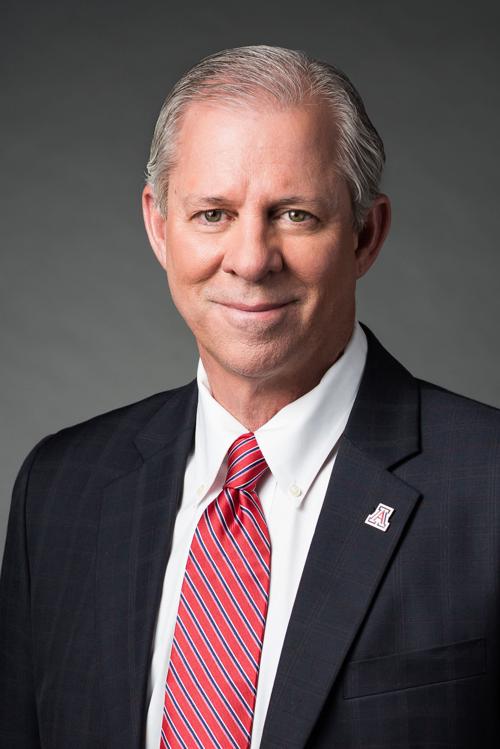The Arizona Board of Regents approved pay raises for all three of Arizona’s university presidents.
On Thursday, the board approved a 5% increase in UA President Robert Robbins’ base pay, from $754,515 a year to $792,241, effective Friday. Robbins, who took the top post at the UA in 2017, received an 8% raise last year. When other benefits are accounted for, Robbins’ total annual compensation exceeds $1 million.
Additionally, the regents approved an extension of Robbins’ contract, which was set through 2024, to June 30, 2025.
Arizona State University President Michael Crow got a 5% raise this year, and will earn a base salary of $792,241; Northern Arizona University President José Luis Cruz got a 12% raise, for an annual base salary of $576,800.
$75K for goals achieved
All three presidents also stand to make additional money by achieving certain goals to benefit their universities.
On Thursday, the regents awarded Robbins an additional $75,000 for the following achievements between 2021 and 2022:
$25,000 for implementing a new budget model to replace Responsibility Centered Management (RCM) and developing and implementing a plan to reduce college and department overhead costs (“Academic Support”) by at least $10 million through the centralization of support services.
$25,000 for developing a strategy to raise attainment in Southern Arizona through partnerships, collaborations and initiatives.
$25,000 for demonstrating substantial progress toward creating a Center for Advanced Immunology at the Phoenix Biomedical Campus, which included documenting related collaboration with NAU and ASU.
Cruz Rivera also received $75,000 for achieving NAU’s goals last year and Crow received $90,000.
$75K if Robbins improves UAGC
The Regents set some new incentives Thursday for all three presidents during the next year and in the longer term.
The goals vary, but Robbins could make a total of $75,000 over the next few years if he’s able to make UA Global Campus, the former for-profit online college the UA purchased in 2020, a UA-affiliate and increase student performance.
Between 2022 and 2023, Robbins stands to make as much as $135,000 if he meets the following goals over the next year:
$45,000 for securing at least $200 million in initial funding commitment from the state of Arizona, local government or private donors by June 30, 2023 for the Center for Advanced Molecular Immunotherapies.
$45,000 for developing a plan to centralize responsibility and balance local authority in the university-wide administrative functional areas of information technology and financial and business services by June 30, 2023.
$45,000 for working with the U.S. Department of Education and appropriate accrediting bodies to complete the transition of the University of Arizona Global Campus (UAGC) as an affiliated partner to its final stage under the full authority and oversight of the University of Arizona by June 30, 2023.
Robbins also has until 2024 to meet the following goals, which total $120,000 in compensation:
$20,000 for increasing retention to 85.5%.
$25,000 for leveraging the Washington, D.C. office of the UA to increase federal research funding by 10%.
$30,000 for collaborating with UA Global Campus and its board and demonstrating substantial progress toward enhancing the student experience and outcomes of UA Global Campus. Measures should include an improvement in the online course completion rate, a decrease in the online student attrition rate, and and increase in the number of UAGC courses taught by faculty who are benefits-eligible.
$25,000 for implementing and documenting an information technology security governance framework that includes: an IT security strategic plan, articulated roles and responsibilities, policies and guidance, training across the university in security awareness, and processes for monitoring and evaluating the effectiveness of institutional IT security practices.
$20,000 for implementing and coordinating a collaborative relationship with ASU and NAU that substantially raises the research potential of the UA College of Medicine-Phoenix.
Dr. Michael Dake, senior vice president for the University of Arizona Health Sciences, describes the UA's vision for developing cutting-edge immunotherapy research.





